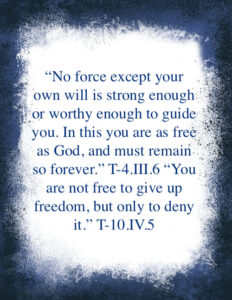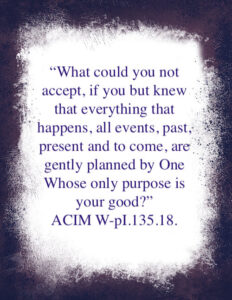
Chapter Twenty-Nine
Are We Replaying a Movie?
Who Wants to Relive a Nightmare?
The Course makes this important statement:
“The first step toward freedom involves a sorting out of the false from the true.” T-2.VIII.4
Students get many opportunities to use their discerning powers as there are numerous teachings in the Course that are open to more than one interpretation. If two interpretations oppose each other they cannot both be true as noted by the Course:
“The truth is true, and nothing else is true… Truth cannot have an opposite. This can not be too often said and thought about. For if what is not true is true as well as what is true, then part of truth is false. And truth has lost its meaning. Nothing but the truth is true, and what is false is false.” W-pI.152.3
This is an important piece of knowledge for the student as he proceeds toward awakening. Although he may be sincere and devout in doing the lessons and studying the text, if he hasn’t correctly sorted out the true from the false interpretations along the way then he has not taken this first step as mentioned by the Course.
Though there are many conflicting interpretations in need of discernment, perhaps the most glaring is the idea that all events in our life are predestined – that there is no free will to determine our future, contrasted with the idea that we have free will to choose which path our life will take.
The first says we are basically characters in a movie which has already been made and the next frame is set and cannot be altered.
The second says that we are indeed in a dream movie experience, but we have free will to make the movie turn out however we choose; however, our choices will eventually lead to our finishing the Course and awakening which is predetermined, for “Only the time you take it is voluntary.” T-in.1
I am going to make a case for the second idea by presenting a number of teachings from ACIM as well as the use of logic and reasoning.
Consider this quote:
“He has created the Holy Spirit as the Mediator between perception and knowledge. Without this link with God, perception would have replaced knowledge FOREVER IN YOUR MIND.” W-pI.43.1
This tells us that the stakes of dreaming are very high. In entering the dream, we risked being caught up in it forever. You wouldn’t think that we would want to take that risk again.
The Course describes this dream experience as a nightmare compared to heaven. If we have already lived the nightmare and awakened from it, then why would we want to relive it again with no control over the character we play as some teach? Why would we again want to lose our memory of heaven and plunge into the bad movie and be deceived into thinking it is happening for the first time?
The Course itself agrees with this reasoning, for it says quite clearly that once would be enough in this dream world:
“When the Atonement is complete and the whole Sonship is healed THERE WILL BE NO CALL TO RETURN.” T-5.I.5
If there is no call to return then why have we returned?
Answer: We have not. We are here for the first time. The Prodigal Son left his father’s house, returned and stayed there.
It makes no sense that the Prodigal would voluntarily lose his memory and replay his bad experience.
Does not Compute
When attempting to discern the truth, it is always helpful to see if a belief corresponds to reality.
Does then the idea that we are in a movie, where the next thing that happens is already set in a movie frame, correspond to a real movie?
Consider this. A movie is either recorded on film, frame by frame, or digitally on a DVD or hard drive. If you do not know what is going to happen next, you can fast forward and see. If you do not like the result, there is nothing you can do to change it.
If one’s life was really a rerun of a movie, then we should be able to fast forward and see what is going to happen in the future. If you saw you were going to cut your finger tomorrow, then when the time came, you would have to cut your finger because that event is embedded solidly in that frame. Can you imagine such a situation? You know that you are going to cut your finger at 1:32 PM and you would like to not do this, but when the time comes your hands and knife move as scripted no matter what your will says. Sounds like a good idea for a horror movie.
The truth is the correspondence does not work. First, we cannot fast forward our life like a movie and see what is going to happen. If we could then someone could produce tomorrow’s newspaper today, something which has never been done. Some basic parts of the future can be seen but not all the details as you would get in fast forwarding a movie.
Secondly, some do get premonitions of the future, but unlike a movie with set frames, one can change it. For instance, there are numerous stories of someone who received a warning to not board a plane that later crashed. When he saw the future, he was able to change it, unlike a movie with frames that cannot be changed.
Obviously, the idea that our life is set in stone like frames of a movie does not correspond.
Remembering the Forgotten
To believe that life here is like a movie, replaying an ancient life, with all future frames set in stone, here is what you would have to believe.
The dream is over and you are safely back in heaven enjoying the bliss, joy and creative endeavors. Even though the Course says that “Nothing that you remember now (in the dream) will you remember. “T-19.IV.D.6 you start to remember and you do the impossible and go “backward to an instant so ancient that it is beyond all memory, and past even the possibility of remembering.” M-2.3
So even though this recorded film is past the possibility of remembering, you suddenly remember each frame in perfection and decide to forget who you are a second time (or maybe many times) and identify with a series of lives that you now see as nightmares from which you have been happy to conclude. All the pain and suffering are now yours for a second time, and what is worse, you decide to start the movie at the beginning where you are in total ignorance of your true identity.
Do you really think we could have been that crazy? Who wants to relive a pleasant life, let alone a painful one?
Not Feeling the Pain
We have covered three points illustrating how watching a movie rerun does not correspond to this dream which is the result of the separation. Now here is a fourth.
When you watch a movie, even one that is good enough to cause you to feel involved, you do not feel the actual pain of the characters involved.
If this life were like a movie rerun, then when one breaks a leg, the watcher may feel some empathy for the character, but he would feel no pain.
Even if the character suffered severe burns or torture, if this were a movie the watcher would feel no discomfort. Instead, he may have the thought, “I’m glad that is not happening to me.”
When the dreamer asks, “Why is this happening to me?” he is acknowledging that he is having an actual experience, not at all like watching a movie for the second or third time.
Identification of Characters
Among the many reasons this life is not like a movie is this: A movie has many characters and when watching, you do not feel the pain of any of them though you may show some empathy for all of them.
In life you identify with only one person, but unlike a watching a movie, you actually feel the pain of that person and go through the experiences of him or her. All the other people in life are seen as separate from you, so you do not feel their pain or live through their experiences as you do through your ego.
Thus, the movie has many characters that you watch, but do not fully identify with. Life also has many characters, but unlike a movie, there is one character with which you fully identify and feel any pain or pleasure experienced. Unlike watching a movie, you fully accept your identity as this character and see this character as having an isolated experience from the others involved.
Stopping the Movie
Here is another way our life in the illusion is different than a movie.
You can stop watching a movie, leave the theater and resume normal life at any time if you do not like what is happening. In this world it is much different. Here we encounter numerous painful events in our life, and if we do not like them, we cannot just decide to leave the theater. True, one could kill himself, but the Course tells us that this would not wake us from the dream.
In addition, there is no way a character in a movie can wake up or choose how long the movie will run. In the movie, the script is indeed written and cannot be changed, whereas the Course tells us that in this world “the time you take it is voluntary.” In other words, you can decide whether to take a long or a short time to take the Course and awaken, for the script concerning the time factor is definitely not written. And if we decide to meander along and take twice the needed time playing in this world, then there would be many things happen that would not be foretold in any script.
The Observer
Since we are at point number seven, with more to come, it should become obvious that there are flaws in comparing this life to a movie that cannot be altered.
Here is another one:
The idea behind the life-is-a-scripted-movie idea is that this life is really over and we are safe in heaven. From that state of bliss, we decided to watch a rerun of our lives during the separation. While watching it we became so involved that we forgot the original movie script and thought that we are one of the characters in the movie rerun; and here we are living out the script without a clue as to what is going on in reality.
This idea falls far short of a correlation to watching a movie here.
First, if you are watching a rerun of a movie in our world you do not forget that you have seen it before and you recall the basics of what is going to happen. The script idea tells us that we have completely forgotten the plot of our story and we do not therefore know what is going to happen next.
Secondly, when you are watching a movie, you never forget that you are the observer and not one of the characters. And remember, we are talking about ourselves as fully conscious Sons of God with much more awareness in heaven than we have in the illusion. If we have power here to maintain the vantage point of the observer, then surely, we had it in the eternal world. It makes no sense that a rerun of a movie would involve us so much that we would lose ourselves in it.
Thirdly, there had to be a time when we actually made the movie, and it would make no sense in talking about watching reruns of the movie in the middle of making it, and before the end is even known. Why would we say the script is written and the next frame is set before the next frames are even filmed?
A Dream, Not a Movie
It is interesting that a large percentage of ACIM students believe that life is like a movie with the next frame being an event that cannot be altered, yet not once does the Course even mention the word.
Yes, the Course does not once use the movie analogy, but it does specifically use something else. And what is that something else?
A dream.
Yes, the Course compares this world not to a movie, but a dream, and tells us of a script that is written to guide us to awaken from that dream of which A Course in Miracles is a guide.
We know for sure that the Course compares this life to a dream, so let us look at the difference between a dream and a movie.
[1] All the events in a movie are unalterably set even before you watch it.
A dream, however is not predictable, follows no script and is created by the ego, and not God. It is written:
“What can He (God) know of the ephemeral” W-pI.152.6 Your dark dreams are but the senseless, isolated scripts you write in sleep.” T-30.VII.6
This would include our dreams at night as well as our life in the world.
[2] We totally identify with the main character in the dream, but we see the movie from the vantage point of the observer. We watch a movie from a distance, but we participate in the dream.
[3] You cannot alter a movie by the power of your thought, but you can alter events in your dream.
[4] You can wake up from a dream and that is the end of it. On the other hand, none of the characters in a movie can wake up. And if you stop watching the movie, the frames of the movie are still there and can be watched again.
Conclusion: The Course compares this life and this world to a dream state, not a movie. There is a big difference between the two.
You are as Free as God
If life here in this world were merely a replay of a movie that cannot be altered, then there would be no such thing as free will. Here is what the life-is-a-replay-of-a-movie idea tells us. It says that the next decision, the next action or next words spoken are set like the next frame of a movie, and there is no way you can change it. Thus, if the next frame has you eating pancakes for breakfast, then you must choose pancakes – you cannot choose fruit or bacon and eggs.
Or, if the next frame has you getting out of bed at 8 AM sharp, this you must do. You cannot choose to sleep another 15 minutes. If this idea were true, then you would have absolutely no choices involved in your life. You couldn’t even choose to procrastinate or to speed up taking the Course, as that would be set in future frames you must act out.
This runs contrary to many passages in the Course. For instance, it definitely tells us that “the time you take it is voluntary.” T-in.1, and “You are free, however, to decide when you want to learn it.” M-2.3
It does tell us that it is in the plan that we will awaken and return, but this does not violate free will because God knows that when enough time passes we will grow tired of the dream world and want to return home of our free will, like the story of the Prodigal Son.
The Course definitely tells us that we have free will – that we are doing more than being little robots going through predetermined motions. Indeed “I am not the victim of the world I see. … Remind yourself that you are making a declaration of independence in the name of your own freedom.” W-pI.31.4
Instead of being controlled by the next frame we are told that “No force except your own will is strong enough or worthy enough to guide you. In this you are as free as God, and must remain so forever.” T-4.III.6
“You are not free to give up freedom, but only to deny it.” T-10.IV.5
However, we are warned that “The mind can miscreate only when it believes it is not free. An ‘imprisoned’ mind is not free because it is possessed, or held back, by itself. It is therefore limited, and the will is not free to assert itself. T-3.II.4
If we buy into the idea that we are not free but each action, word and thought we think is predetermined, then we are likely to misuse our God-given powers and miscreate.
We have miscreated enough without adding more fuel to the fire.
The Course and Predestination
The idea that our future in life here is fixed and cannot be changed, like the frames of a movie rerun is out of harmony with numerous passages from ACIM. The only thing truly predestined is our return home, and even this is determined by our free will, for every soul will eventually choose love over fear. “It is only the end that is certain.” M-22.2
Whereas God does have a script for our atonement and awakening, life within the illusion has no set script from God and is subject to our whims of thought.
The plans you make for safety all are laid within the future, where you cannot plan. No purpose has been given it as yet, and what will happen has as yet no cause. Who can predict effects without a cause? T-26.VIII.5
Here we are told that we cannot accurately plan for the future because it does not yet have a real or eternal cause. This world has unpredictable effects because of illusionary, or temporary causes.
In addition, we are told that unlike a movie, the future of our life can be changed:
“When you make a decision of purpose, then, you have made a decision about your future effort; a decision that will remain in effect unless you change your mind.” T-4.V.6
You can change your future by changing your mind, but if you are watching a movie, you cannot change the future frames and scenes.
Even our mundane daily occurrences are up to our decisions rather than the next frame in a movie script:
“Do not fight yourself. But think about the kind of day you want, and tell yourself there is a way in which this very day can happen just like that. Then try again to have the day you want.” T-30.I.1
If life is a replay of a movie, then it would be fruitless to plan the day we want.
Even though God has a script that is written that insures we return home, everything that happens in the mind of the ego has nothing to do with Him, and He has no interest in the unpredictable dream itself.
Here we see that the things that happen on the path of return cannot be predicted:
“The path becomes quite different as one goes along. Nor could all the magnificence, the grandeur of the scene and the enormous opening vistas that rise to meet one as the journey continues, be foretold from the outset.” M-19.2
Then we are told that what happens on this journey through life cannot be predicted because “What you made can always be changed.”
“Only what God creates is irreversible and unchangeable. What you made can always be changed because, when you do not think like God, you are not really thinking at all.” T-5.V.6
We can even change the dream and replace it with a different one:
“If you are the dreamer, you perceive this much at least: that you have caused the dream, and can accept another dream as well. But for this change in content of the dream, it must be realized that it is you who dreamed the dreaming that you do not like.” T-28.II.5
So, unlike a movie where the frames are set, the content of our life is not. Our free will can alter the dream and even replace a dream with another dream.
The Two Scripts
The Course doesn’t mention the movie idea but it does tell us there is a script and implies that the end result of returning home is a sure thing. Even here, it stresses that there is free will, which will determine how long it takes. So, how can there be free will when the end is determined? An analogy may help us to understand.
Suppose you had a toothache that is getting progressively worse. You have the free will to not go to the dentist, but when the choice comes down to pain or no pain, you will eventually pick the latter.
We are in a similar situation. We are in a dream where lots of pain happens and when we learn there is a way to end the pain, then it is only a matter of time before we choose it of our own free will. God doesn’t force any decision upon us.
Something else that is overlooked is that there are two scripts. The first is the script of return wherein the Holy Spirit is our guide. In this “are all but aspects of the plan to change your dreams of fear to happy dreams, from which you waken easily to knowledge.” T-18.V.1
The second is the “fearful script” of the ego concerning which, nothing is sure.
“Fear is a judgment never justified. Its presence has no meaning but to show you wrote a fearful script, and are afraid accordingly. … Your dark dreams are but the senseless, isolated scripts you write in sleep.” T-30.VII.3&6.
“You add an element into the script you write for every minute in the day, and all that happens now means something else. You take away another element, and every meaning shifts accordingly. What do your scripts reflect except your plans for what the day should be? And thus you judge disaster and success, advance, retreat, and gain and loss.” T-30.VII.1-2
The script of God honors our free will, and God merely waits for our correct decision. The script of the ego is not predictable and leads to chaos and “dark dreams.”
Copyright by J J Dewey
Read the Introduction HERE, Read Chapter One HERE. Chapter Two HERE, Chapter Three HERE, Chapter Four HERE, Chapter Five HERE Chapter Six HERE, Chapter Seven HERE, Chapter Eight HERE, Chapter Nine HERE, Chapter Ten HERE, Chapter Eleven HERE, Chapter Twelve HERE, Chapter Thirteen HERE, Chapter Fourteen HERE, Fifteen HERE, Sixteen HERE, Seventeen HERE, Eighteen HERE, Nineteen HERE, Twenty HERE, Twenty-One HERE, Twenty-Two HERE, Twenty-Three HERE, Twenty-Four HERE, Twenty-Five HERE, Twenty-Six HERE, Twenty-Seven HERE, Twenty-Eight HERE, Twenty-Nine HERE, Thirty HERE
ACIM Conversations, Part 1, Part 2, Part 3, Part 4, Part 5, Part 6, Part 7, Part 8, Part 9, Part 10, Part 11, Part 12, Part 13, Part 14, Part 15, Part 16, Part 17, Part 18, Part 19, Part 20, Part 21, Part 22, Part 23, Part 24, Part 25
Index for Original Archives
Index for Recent Posts
Easy Access to All the Writings
For Free Book go HERE and other books HERE
JJ’s Amazon page HERE



